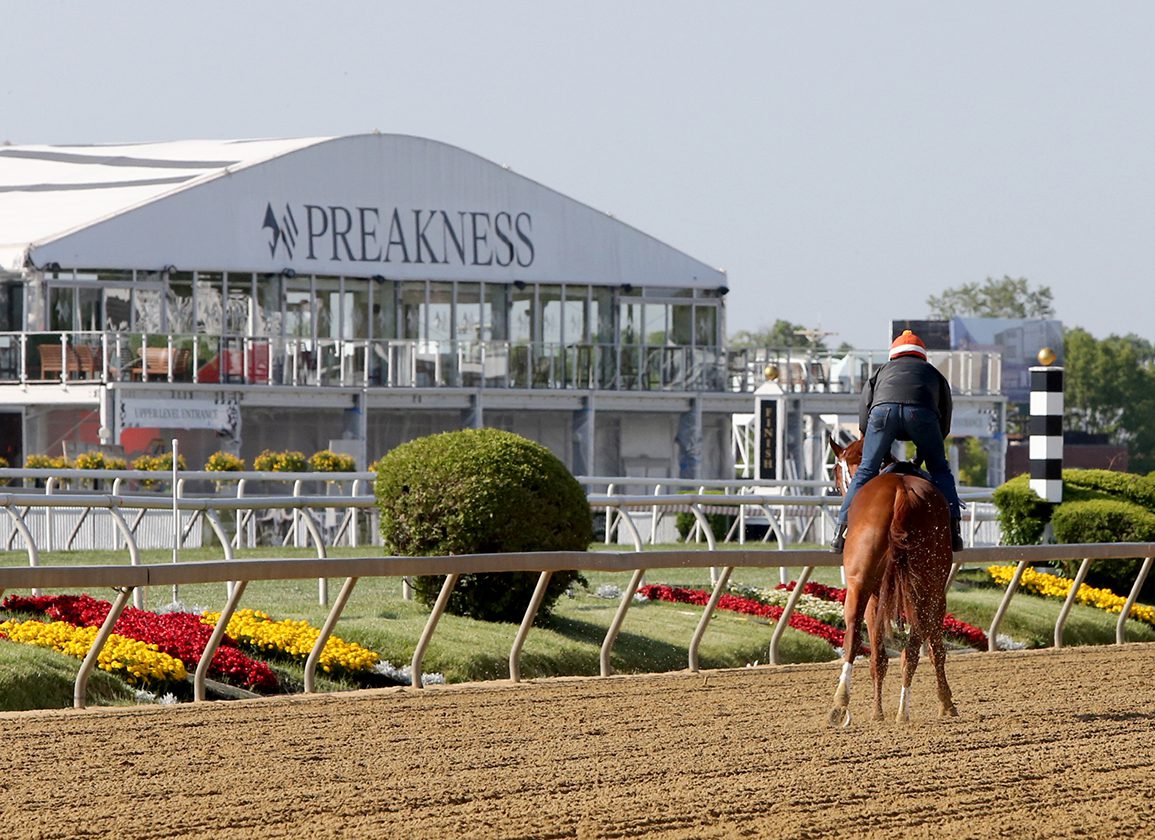By Bill Finley
There was an exciting race, a thrilling stretch duel between winner National Treasure (Quality Road) and runner-up Blazing Sevens (Good Magic), and the first-ever win in the GI Preakness S. by classy Hall of Fame jockey John Velazquez. And think what you want of Bob Baffert, but his winning the first Triple Crown race he entered since the suspensions and bans had ended was a compelling chapter to this story. The man sure can train a race horse.
But those stories will start to drift away as we head to the GI Belmont S. and beyond. The one that will not is that this was another Triple Crown race marred by the death of a race horse. Havnameltdown (Uncaptured) broke down on the undercard, during the running of the GIII Chick Lang S., and had to be euthanized. That he is also trained by Baffert was red meat for racing's many critics.
This came after seven horses died at Churchill Downs in the lead-up to the GI Kentucky Derby. Two more horses have died at Churchill since the Derby, including one on Saturday.
From the mainstream media, the takes on the Preakness were predictable. A front-page, above-the-fold story in the Baltimore Sun appeared under this headline: 'National' Conflict. National Treasure's victory in the race contrasted with a horse's death earlier in the day–highlighting the controversy in a historic, but deadly sport. This was the headline on the Associated Press's report of the race: “Baffert back from ban, wins Preakness with National Treasure after another horse euthanized.”
And please don't dismiss this as noise from those who don't understand our game. On the two biggest racing days of the year so far, two days where the general public is paying attention to the sport, we left them with a dark and disturbing narrative, that as long as there is horse racing, horses will die. What's not to understand about that? We had hoped the Preakness card would shift the story, that the day would be without incident, that Mage (Good Magic) would win again and put himself in position to win a Triple Crown, and that we could put the seven deaths at Churchill in the background, at least somewhat. So much for that.
Had it happened to any other trainer, the story wouldn't have taken off like it did. But Baffert, because he is highly visible, trains a lot of very good horses, and has had his problems, is under the microscope like no other trainer.
A day after the Preakness, the Baltimore Sun, never known to be an anti-racing publication, was at it again. This time the subject was Baffert. The headline read “After a record-setting victory, Bob Baffert remains a messy figure atop a messy sport.” The story included this take on the Hall of Famer: “No one does a better job preparing horses to meet their potential on the most-watched stages in racing. No one inspires greater distaste from those who see racing as corrupted by drugs and death.”
Does Baffert deserve to have all the fingers pointed at him? He has had a spotless medication record since coming back from suspension and Havnameltdown was the first horse of his to break down in a race since he came back. Pimlico officials were extra careful to check every horse racing on the card from head to toe and their vets found nothing wrong with Havnameltdown. That Baffert would never have another horse break down was never going to happen. This one just happened to happen at the worst time possible.
In the aftermath of his roller-coaster day, the sport saw a side of him rarely seen. He was obviously very troubled by the death of the horse and during at least one interview was fighting back tears. It was more of the same Sunday when he spoke to the Pimlico media team.
“To me, the memory of this race would be that I lost Havnameltdown,” he said. “It was nice to win the race, but to me it was a pretty sad day.” He continued: “I'm still upset about losing that horse yesterday. My memory of this race is going to be about him. It just took all the fun out of it.”
None of what he said either Saturday or Sunday seemed contrived or an act. You could tell that he was really hurting.
But this shouldn't be about Baffert. It is much bigger than that. It is about what happened at Santa Anita in 2019. It is about the deaths at the Derby. It is about the two horses that died just down the road at Laurel on the April 20 card. It is about those horses you never heard of who have died in races, like Hair of the Dog (Hangover Kid), who died in a $4,500 claimer on April 1 at Charles Town, while no one was paying any attention.
Yes, we can and have done a better job protecting these horses. We could do better still, starting with changing all dirt tracks to the much-safer synthetic surfaces that are out there. That would make a huge difference. But I won't waste much more time on that argument because that's never going to happen. Then there's HISA. It is not a magic bullet, but it should make things better. It goes into effect Monday.
But here's the real problem. We will not ever eliminate breakdowns that lead to horses being euthanized. We still have a social license to operate, but will that last forever? The best we can do right now is to ask the public to accept that horses dying in races is inevitable and that we are working on the problem. That's a tough sell.
Then we cross our fingers, move on to the next big race and hope and pray that nothing goes wrong. It's a terrible position to be in.
Not a subscriber? Click here to sign up for the daily PDF or alerts.






